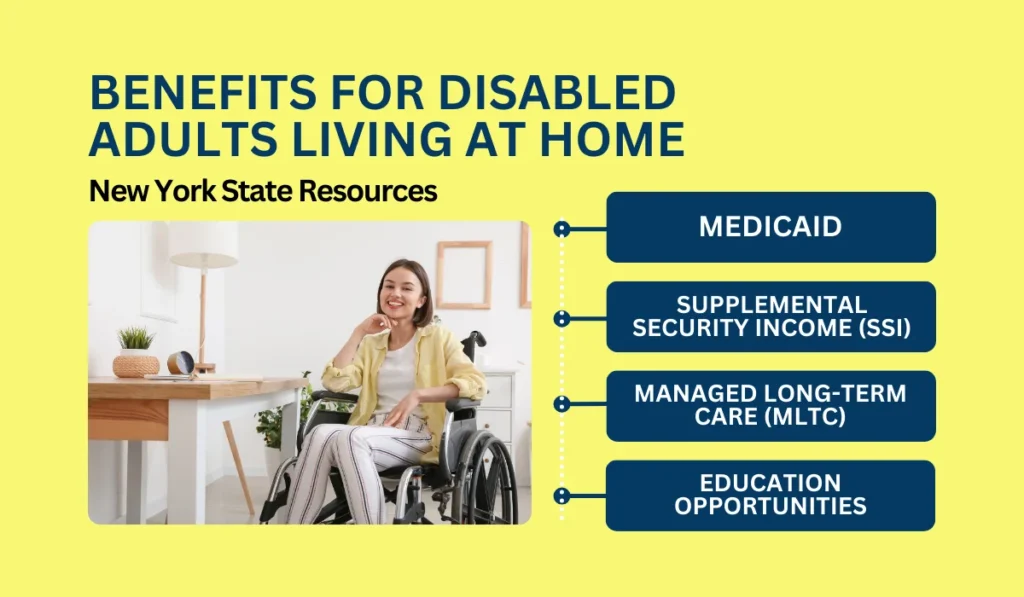Up to 26% of American adults are living with some type of disability, yet many are unaware of their eligibility for the resources available to them.
If you’re a disabled New Yorker living at home, you may qualify for a number of state and federal programs that may help you get medical care, cash for essentials, and even higher education and job training.
Below is a breakdown on who qualifies and how to apply to receive these benefits for yourself and your loved ones.
Key Takeaways
- Some disabled adults in New York qualify for Medicaid, which covers medical care and potentially other health care benefits such as home health aides.
- Disabled adults in New York may also qualify for Supplemental Security Income (SSI), which provides monthly cash deposits to cover basic necessities.
- Disabled New Yorkers can apply for ACCES-VR, a program that offers resources that make it easier to get, keep, and advance in a job while living with a disability.
Apply for CDPAP or HHA today

Medicaid
Disabled adults in the state of New York may qualify for Medicaid. Medicaid covers doctors’ and clinic visits and exams, immunizations, any needed medical supplies and equipment, lab tests, x-rays, prescriptions, vision, dental, nursing home services, hospital stays, and any emergencies.
It even covers emergency transportation via ambulance, prenatal care, and tools to quit smoking.
To see if your disability means you qualify for Medicaid, check this document for the eligibility requirements—a variety of conditions may mean you qualify, from musculoskeletal disorders to mental disorders to cancer.
You can apply for Medicaid at your Local Department of Social Services Office by calling 800 541-2831, or online where enrollment assistance is available.
A Medicaid Buy-In Program exists for people with disabilities who work full-time or part-time and earn more than the limit to qualify for regular Medicaid ($20,121 yearly for an individual, $27,214 for a couple).
You may be eligible for the program if you earn up to $73,932 (individual) or $99,636 (couple). This means that you’ll receive regular Medicare benefits, but may pay a modest premium (or Medicare may cover the premium for the health insurance provided by your employer). You can apply for this program at your Local Department of Social Services Office.
Through Medicaid, you may qualify for the Program for All-Inclusive Care (PACE), through which you can receive care from a skilled nurse, home health aide, or personal care aide.
You may also qualify for the Personal Care Services Program (PCS), through which you’d receive a caregiver to aid with household tasks like cooking, cleaning, bathing, and using the bathroom as needed.
Supplemental Security Income (SSI)
Supplemental Security Income (SSI) is a program that provides financial assistance to meet basic needs like clothing, food, and shelter for disabled adults with limited resources.
If you meet Federal Disability requirements (i.e., you have a physical or mental condition limiting or affecting “major life activities”) and are “insured” (i.e., you worked for at least 10 years and paid Social Security taxes), you’re eligible to apply.
You are considered disabled under Social Security rules if you are unable to work (or cannot do work you used to do) due to a medical condition, it’s determined that you couldn’t adjust to other work, or if your disability has lasted/will last at least a year or will result in death.
SSI is a monthly benefit (the amount depends on your lifetime average earnings) that’s deposited directly into your bank account or on an SSA (Social Security Administration) Direct Express Card.
The current maximum amount per month for SSI benefits is $914 for an individual ($1,371 for a couple, $458 for a member of the household who provides essential care).
You can apply for SSI online.
Managed Long-Term Care (MLTC)
MLTC is a program that provides long-term care services to individuals with chronic illnesses or disabilities who require ongoing medical and personal care assistance to remain safely at home.
The program is designed to help individuals maintain their independence and quality of life, while also ensuring they receive the care they need.
The MLTC program is mandatory for individuals who:
- Are dual eligible for Medicaid and Medicare
- Require long-term care services for more than 120 days
- Are over 21 years old
The MLTC program is voluntary for individuals who:
- Are dual eligible, 18-20 years old, require long-term care services for more than 120 days, are nursing home eligible
- Are not dual eligible, over 18 years old, and are nursing home eligible
The benefits of the MLTC program include access to a range of services, including:
- Nursing care
- Physical therapy
- Occupation therapy
- Personal care assistance.
Participants also have access to the Care Management Administrative Services (CMAS), which help coordinate their care and ensure they receive the appropriate services based on their individual needs.
Education Opportunities
If your disability impacts your ability to get, keep, or advance in a job, you’re at least 14 years old, you’re currently present and available in New York State, and you’re able to work in the United States, you’re eligible to apply for Vocational Rehabilitation Services.
There are a variety of resources available under the ACCES-VR program available to assist you in getting the education or training you need to get a job. This might include tuition, related fees, and required textbooks for college or vocational school, as well as tutor, reader, and note taker services as needed.
It might also include career coaching and counseling, medical care, special transportation, accessibility modifications to your home/vehicle/place of work, occupational and business licenses, supplies for self-employment, and even on-the-job training.
You can apply for ACCES-VR online.